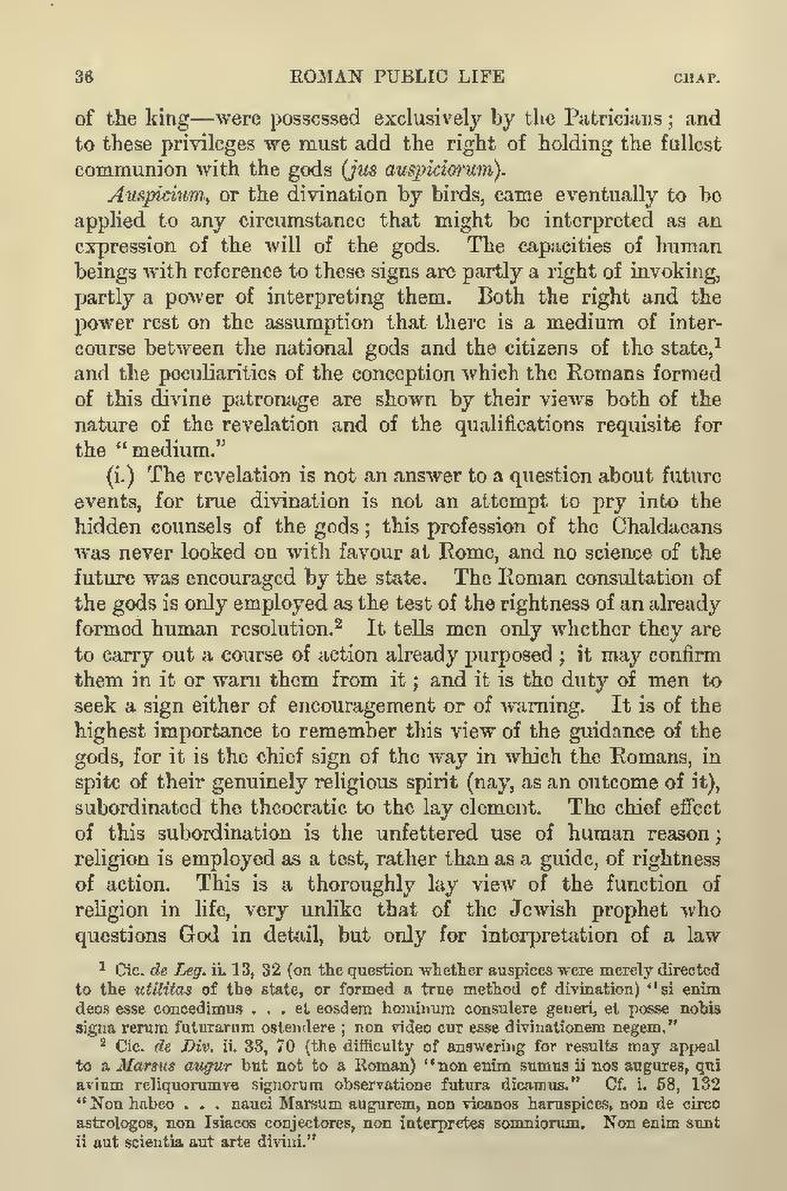of the king—were possessed exclusively by the Patricians; and to these privileges we must add the right of holding the fullest communion with the gods (jus auspiciorum).
Auspicium, or the divination by birds, came eventually to be applied to any circumstance that might be interpreted as an expression of the will of the gods. The capacities of human beings with reference to these signs are partly a right of invoking, partly a power of interpreting them. Both the right and the power rest on the assumption that there is a medium of intercourse between the national gods and the citizens of the state,[1] and the peculiarities of the conception which the Romans formed of this divine patronage are shown by their views both of the nature of the revelation and of the qualifications requisite for the "medium."
(i.) The revelation is not an answer to a question about future events, for true divination is not an attempt to pry into the hidden counsels of the gods; this profession of the Chaldaeans was never looked on with favour at Rome, and no science of the future was encouraged by the state. The Roman consultation of the gods is only employed as the test of the rightness of an already formed human resolution.[2] It tells men only whether they are to carry out a course of action already purposed; it may confirm them in it or warn them from it; and it is the duty of men to seek a sign either of encouragement or of warning. It is of the highest importance to remember this view of the guidance of the gods, for it is the chief sign of the way in which the Romans, in spite of their genuinely religious spirit (nay, as an outcome of it), subordinated the theocratic to the lay element. The chief effect of this subordination is the unfettered use of human reason; religion is employed as a test, rather than as a guide, of rightness of action. This is a thoroughly lay view of the function of religion in life, very unlike that of the Jewish prophet who questions God in detail, but only for interpretation of a law
- ↑ Cic. de Leg. ii. 13, 32 (on the question whether auspices were merely directed to the utilitas of the state, or formed a true method of divination) "si enim deos esse concedimus . . . et eosdem hominum consulere generi, et posse nobis signa rerum futurarum ostendere; non video cur esse divinationem negem."
- ↑ Cic. de Div. ii. 33, 70 (the difficulty of answering for results may appeal to a Marsus augur but not to a Roman) "non enim sumus ii nos augures, qui avium reliquorumve signorum observatione futura dicamus." Cf. i. 58, 132 "Non habeo . . . nauci Marsum augurem, non vicanos haruspices, non de circo astrologos, non Isiacos conjectores, non interpretes somniorum. Non enim sunt ii aut scientia aut arte divini."
